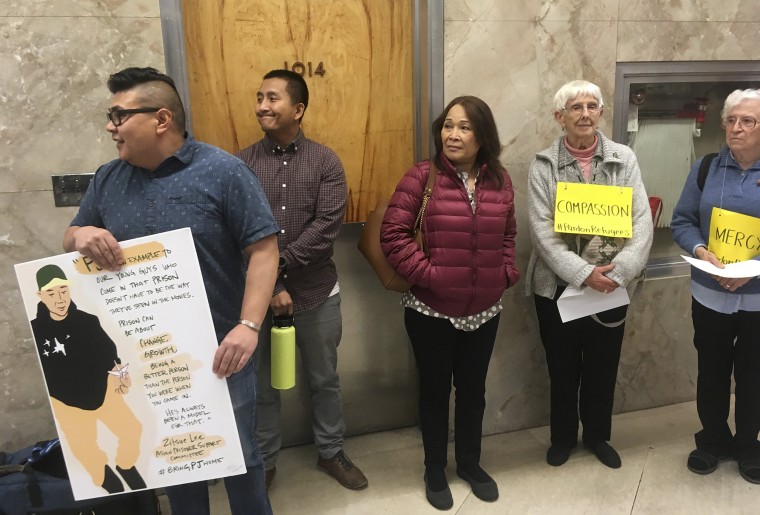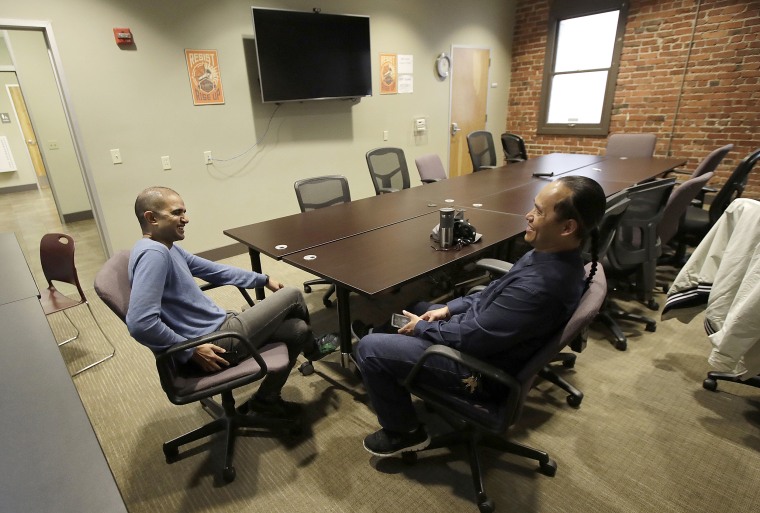He spent 19 years in prison before parole officials decided he had turned his life around. He walked out of San Quentin prison in November 2016 and into the custody of waiting federal immigration agents.
Ai is now 37 and asking California Gov. Jerry Brown to wipe away his criminal conviction and likely prevent his deportation to Cambodia, a nation where his mother was born but he has never seen. After prison, he spent 18 months in federal detention but was freed in May after Cambodia refused to accept him — for now.
Parole officials recommended a pardon for Ai last week. Dozens of advocates turned in more than 36,000 signatures Wednesday asking Brown to pardon Ai and others before he leaves office in January.
They held 60 origami cranes and rang a Buddhist bell 60 times, one for each of the 60 people nationwide they said are facing deportation to Cambodia. About half are from California, given its large Cambodian population, and about a dozen have pardon petitions before Brown, with more on the way, said Angela Chan, a spokeswoman for Asian Americans Advancing Justice-Asian Law Caucus.
The prospect frustrates relatives of Ai’s victim, Manijeh Eshaghoff. The governor in the last 10 months has pardoned seven ex-convicts who otherwise faced the threat of deportation to Cambodia, bringing an angry tweet from President Donald Trump in March.
Ai was tried as an adult, pleaded guilty to second-degree murder and was sentenced to 25 years to life in prison after California dropped the minimum age for trying juveniles as adults from 16 to 14 in 1995. California this year reversed course, barring any 14- or 15-year-olds from being tried outside the juvenile system, even for murder.

According to a Human Rights Watch analysis of California data, 87 14-year-olds were prosecuted for murder as adults from 2007 to 2016. Convictions are not broken down by age.
There are parallels between Ai’s journey and that of the woman he killed. Both are from immigrant families who fled oppression from opposite sides of the world only to tragically intersect in a strip mall convenience store in San Jose shortly before midnight on Feb. 4, 1996.
Ai’s mother fled Cambodia’s genocidal Khmer Rouge regime. He was born in a Thai refugee camp and came to the U.S. when he was 4 as a refugee with permanent legal resident status.
His family lived among Stockton’s large Cambodian community, but Ai recalls growing up in a troubled area plagued by drugs, gangs and prostitution. He saw his 7-year-old cousin and four other children fatally shot at Cleveland Elementary School in 1989 in a mass shooting that targeted immigrant children.
At 12, he joined a street gang that “became like my sense of family,” he said in an interview with The Associated Press.
At 14, he was the youngest of four who robbed Eshaghoff’s convenience store and killed her. Ai said he accidentally shot her when she grabbed his gun and he jerked back with his finger on the trigger. She was 52.
Her son David Esh, who uses a shortened version of his family’s name, was 25 when she died.
“She bled out in less than a minute — it was instant how quickly she died. That’s the only solace I’ve had over the years; she didn’t suffer,” he told AP.
His father, Essag, was standing a few feet away and held his wife as she died, soaked in her blood.
“This was premeditated murder, accident or not,” Esh said. “They already had the money, all he had to do was run.”
Like Ai’s mother, Esh’s father had fled for his life from his home country. An Iranian Jew, he had done work for the shah before the Iranian Revolution in 1979.
“My father fled in the trunk of a car through the desert,” Esh said. “They worked hard. They sacrificed.”

Esh wants the governor to deny Ai’s pardon request. A majority of the state Supreme Court will have to agree that Ai may be pardoned before Brown makes his decision.
By all accounts, Ai turned his life around in prison, joining or starting several anti-gang and anti-violence groups and becoming a counselor — work he continues with three nonprofits while on lifetime parole.
His pardon application includes nearly 300 pages documenting accomplishments and good deeds. Twelve state lawmakers who are part of the California Asian & Pacific Islander Legislative Caucus are among those supporting it.
The Trump administration began cracking down on immigrant communities and pressuring reluctant nations like Cambodia to accept the return of their citizens, said one of Ai’s attorneys, Anoop Prasad of the Asian Law Caucus’ Immigrant Rights Program.
A governor’s pardon doesn’t automatically stop deportation proceedings, but it eliminates the convictions on which authorities based their deportation.
“I understand and appreciate that he’s gone through and served his sentence and perhaps is trying to be a positive person in society,” Esh said. Yet, “he gave us all a life sentence, and he’s going to walk free and have a pardon as if this never happened?”
Ai said he understands.
“My crime caused pain and a ripple effect forever. Because of that, I have a moral responsibility to continue to be a citizen of my community, continue to honor that memory,” Ai said.
The governor usually reserves pardons for offenders who completed their sentences long ago. Santa Clara County Deputy District Attorney Aaron West argued that Ai has been free for only months and has no track record of being a benefit to the community.
Every case is assessed on its own merits, said Brown’s press secretary, Evan Westrup, adding that “the voices of victims and their families are profoundly important in every request the governor considers.”

One thought on “Facing deportation, Cambodian refugee who killed as 14-year-old seeks pardon”